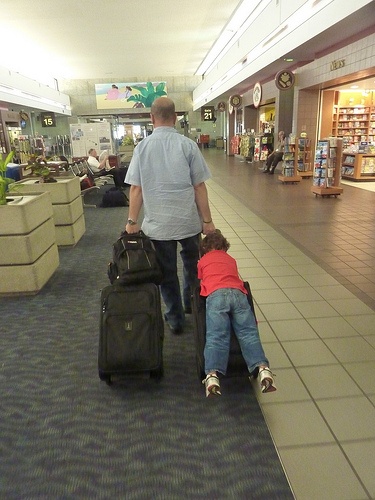

Everyone enjoys going on holiday, but the process of getting there can be fraught with problems. However, when young children are added to the mix, the planning and preparation for a holiday can seem even more arduous.
Taking babies, toddlers and sometimes young children on holiday requires an element of military precision in the planning process, in order to ensure that everything goes smoothly and that nothing is left to chance.
There are a few things that can be done to make the process easier and remove some of the stress from what is supposed to be a pleasurable and relaxing time for everyone.
When choosing the destination, remember that children tend to enjoy slower paced holidays than most people are used to. Keep the holiday as simple as possible and be prepared to spend some days indoors when the weather is bad or the children are tired.
Look out for family holidays in centres that provide childminding or listening services, so that parents can have a meal together in the evening knowing the children are safe. Some centres have children’s clubs for five to ten year olds, so they can mix with other children under supervision.
As far as you are able, try to maintain the daily schedule throughout the holiday, particularly with regard to meal times and naps. If it is not possible to keep the routine during the journey, re-establish it as soon as possible after reaching your destination.
Pack as lightly as possible, as it is difficult to manage lots of luggage as well as excited or fractious children. But be sure to have essential items in hand luggage just in case there are problems with checked in luggage.
Check hand luggage restrictions with the airline before hand. Make sure that any prescription medication and enough drinks and foodstuffs for babies, toddlers and children are packed in hand luggage, along with any favourite toys and spare clothes and diapers for babies.
Children tend to get bored quickly, so do not let them have all the toys at the same time during the journey. Spread the toys out through the whole of the journey so that the children maintain interest and don’t get bored.
It is wise not to put children in the aisle seat during flights, otherwise it is difficult to keep them under control and out of harm’s way, especially if the journey is a long one. While most travellers are tolerant where children are concerned, they become less tolerant as they grow more tired and the children become unruly.
Taking a stroller or pram can be useful if you have toddlers or young children, as they are not able to walk far and when they are walking, heavier items can be placed in the stroller, allowing you to keep up with them as they explore new surroundings.
Share the responsibility of watching smaller children amongst all the adults and older children in the party, so that everyone has the opportunity to enjoy the holiday. Each day, arrange one central meeting place, where anyone who should get separated from the group can go to so they can be easily found.
Whether travelling here or abroad, if you plan to hire a car, be sure to use appropriate car seats for young children. Universal car seats that use can be used with most types of seat belt may be advisable if using a hire car is planned during the trip.
If the holiday is in the tropics or hotter climates, pack sun block, sun hats and clothes made of natural fibres such as cotton, to keep rashes to a minimum. If the sun is particularly bright, children’s sunglasses may be advisable, as their eyes may be sensitive.
While abroad, be sure to use bottled or sterilised water to drink and make up any baby formula needed. It is wise to eat at places that are busy, so that the food is not stored or on display for any length of time. Do not eat food that does not look right or drink from bottles with broken seals.
It is also advisable to carry basic non prescription medications for children with you, such as Piriton and hydrocortisone cream for allergic reactions and children’s Paracetamol, as children can develop raised temperatures unexpectedly.